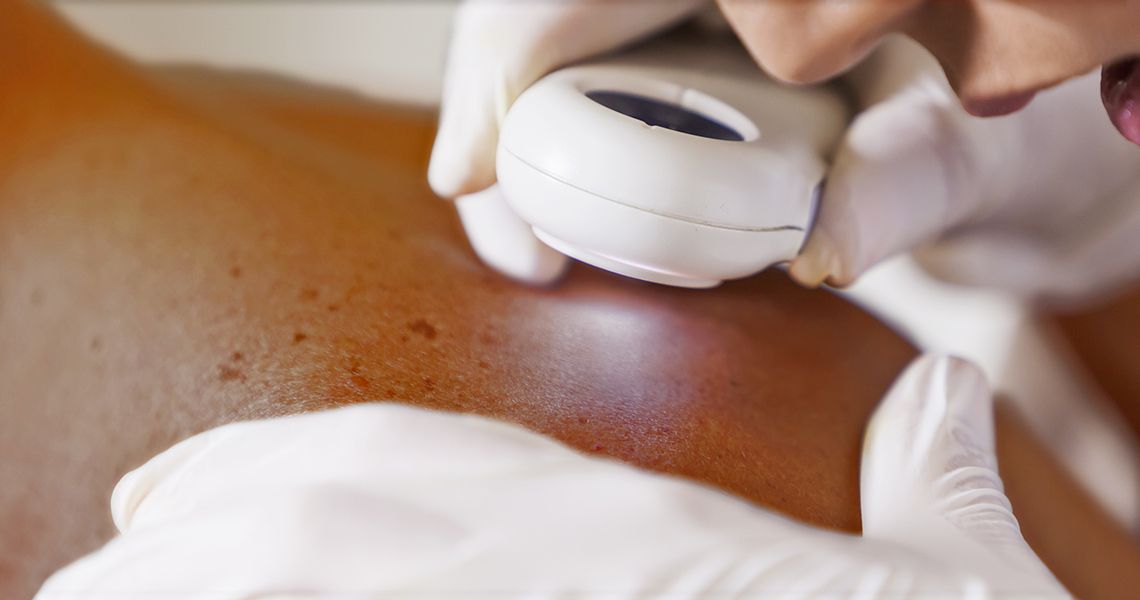The George Washington University School of Medicine and Health Sciences (GW SMHS) Department of Dermatology, in partnership with the National Psoriasis Foundation and Pennsylvania Avenue Baptist Church, recently received a $500,000 sponsorship from Johnson & Johnson Innovative Medicine, formerly Janssen Pharmaceuticals, to facilitate the expansion of an innovative, free teledermatology program targeting education about, and care of, Psoriasis and associated medical conditions, as well as other inflammatory skin diseases.
The program — EACH one TEACH one, or Expanding Access to Comprehensive Health Care — will enhance the dermatologic care of residents in Wards 7 and 8. The multimodal approach will not only support a free dermatology clinic, but also will offer comprehensive community outreach program in southeast Washington, D.C., to understand and identify best practices to improving access to care.
“Our comprehensive strategy builds upon a successful program we executed during the pandemic at the peak of limited health care access. By both engaging with the community we hope to serve at an unparalleled level in partnership with a national organization like the National Psoriasis Foundation, and screening for and tackling comorbidities associated with inflammatory skin diseases with our partners in internal medicine and primary care, we aim to create a new model supported by best practices that can be employed in other underserved areas” said Adam Friedman, MD, FAAD, chair of the Department of Dermatology at GW SMHS, who — along with Jonathan Silverberg, MD, PhD, professor of dermatology and director of clinical research at GW SMHS; Nehal N. Mehta, MD, MSCE, clinical professor of medicine at GW SMHS; and George Gondo, MA, director of patient-center research at the National Psoriasis Foundation — serves as a project lead.
The Johnson & Johnson sponsorship builds on a previous grant-funded GW SMHS Teledermatology Help Desk, initiated in 2021 in partnership with the Temple of Praise Church to address atopic dermatitis and alopecia areata for residents of Ward 7 and Ward 8 of Washington, D.C. Patients in that program were integrated into the GW Medical Faculty Associates medical records system, provided instruction on using telemedicine and comprehensive education about atopic dermatitis, and they received a free telemedicine visit with a member of GW’s Department of Dermatology.
A follow-up survey from that pilot study revealed that most patients did not have a dermatologist (70%), but after participating in the program, nearly all (94%) were extremely satisfied and reported that that the clinic significantly changed their atopic dermatitis management (90%).
Lessons learned from the 2021 teledermatology clinic, Friedman added, as well as the experience and networks forged by GW faculty members and students, led to this next step toward offering holistic, dermatologic care.
Roughly 1.8 billion people worldwide are affected by dermatologic disease according to the World Health Organization. Closer to home, as many as one in four Americans have some form of skin disease, according to the American Academy of Dermatology Association. Psoriasis is a classic example of the common chronic dermatologic conditions associated with considerable disease burden and corresponding comorbidities that add to this burden on individuals.
The EACH one TEACH one project will address the underlying structural factors that promote health disparities experienced by the residents of Wards 7 and 8. Along with the National Psoriasis Foundation and local community partners, the program will create structural intervention to expand access to comprehensive dermatologic care for residents – including common comorbidities associated with psoriasis such as cardiovascular disease and metabolic syndrome. The team will develop care delivery models and establish community-based networks to connect residents to existing and emerging health care resources, including Cedar Hill Regional Medical Center, GW Health, the $403 million hospital complex currently under construction in Anacostia once operational.
“The number of dermatologists/dermatology clinics in this part of the District, an area that can best be described as a dermatology desert, is disproportionately low to serve the health needs of this large population,” Friedman explained. “Outcomes and access to care among these residents is lagging to an unacceptable level.”
Beyond expanding access to dermatologic care that is purposefully timed, located, and marketed to ensure those in need can actually utilize, EACH one TEACH one looks to address a variety of shortcomings that impact access and perpetuate health disparities. Lack of familiarity among physicians about how dermatologic diseases present differently as a result of different factors, such as skin tone, Friedman explained, can contribute to misdiagnosis and mismanagement. Educational resources and training opportunities, he added, are central to overcoming this gap.
The diversity of subjects recruited for population-based studies or clinical trials can also bias the data generated, impacting the translatability of this work. Medical students from GW SMHS, Georgetown University, and Howard University will receive both didactic and in-person clinical exposure to help narrow this gap. Dermatology residents also will be actively part of caring for participating patients.
To follow-up, project leaders will conduct a robust evaluation plan to assess program implementation, processes, impact, and outcomes. Researchers will review the number of participants — particularly those with dermatologic conditions receiving comprehensive health screenings for related comorbidities such as type 2 diabetes, cardiovascular disease, high cholesterol, and depression. The assessment also will measure improved diagnostic outcomes for psoriasis patients and enhanced dermatologic-related quality of life.
For more information about dermatology or make an appointment, visit GW Dermatology or call 202-741-2600.



